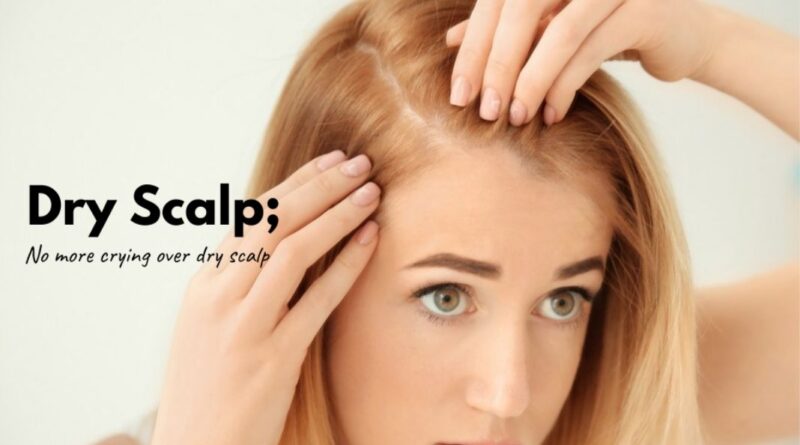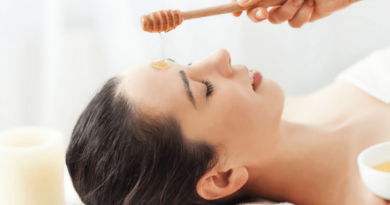How to Get Rid of Dry Scalp at Home
Does an itchy dry scalp leave you scratching your head for solutions for how to cure dry scalp? Nearly 42% of the population(1) across various age groups and demographics suffer from dry scalp at some point in their life.
Table of Contents
Did You Know!
Men are more prone to dry scalp than women.
Simply stating that dealing with dry scalp is annoying is an understatement. Fortunately, it is a problem that can be sorted out right from the comforts of your home. There are multiple home remedies that help answer the most important question: how to fix dry scalp?
Here is a quick lowdown on how to get rid of the dry scalp!
How to Get Rid of Dry Scalp Naturally?
- Home Remedies
- Natural Remedies
- Essential Oils
- Supplements
- Foods
Dry Scalp vs Dandruff
Dry scalp and dandruff have common symptoms, dry scalp flakes that fall out from your scalp. However, dry scalp and dandruff are not the same. The primary difference between the two is that dry scalp is caused when your skin doesn’t get enough moisture. On the other hand, dandruff is caused by the excess production of oil by the scalp.
If you have dry scalp, the dryness in your skin may be seen on other parts of your body like arms and legs – dry scalp results in smaller, dry flakes of skin. Dandruff is characterized by oily, red, and scaly skin where the flakes are oily, large, and yellow, or white.
Causes of Dry Scalp
Before you explore how to treat dry scalp, it is important to identify the causes of dry scalp. This way, you can not only get rid of dry scalp, but you can also keep it at bay. Here are a few common causes of the dry scalp:
- Not drinking enough water.
- Excessive and prolonged use of chemicals and harsh shampoos.
- Prolonged exposure to hard water.
- Fungal infection.
- Exposure to direct heat and similar extreme weather.
- Seasonal changes.
- Excessive use of hair styling products.
- Neglecting hair care.
- The lack of nutrients due to poor diets.
CURE 1: Home Remedies for Dry Scalp
Here is a list of natural remedies for dry scalp, which will address the root cause of your problems:
1. Apple Cider Vinegar for Dry Scalp
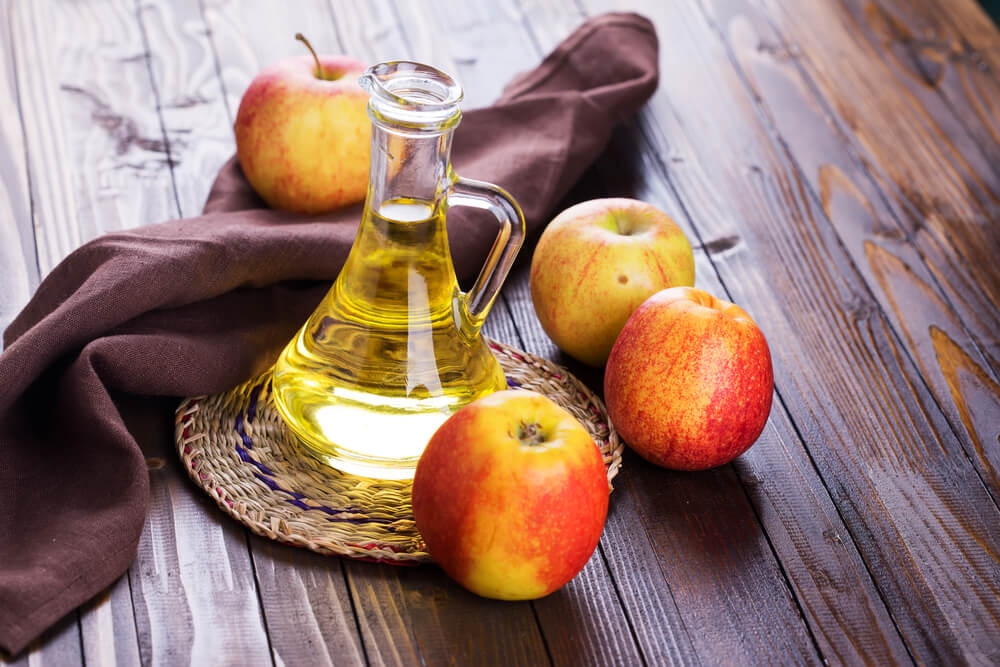
Apple Cider Vinegar, or ACV, can target a wide range of skin-related issues. Hence, it comes as no surprise that it can also fix dry scalp!
Why Does It Work?
ACV is a natural astringent and, as such, offers the scalp a deep cleanse(2). Further, it not only gets rid of microbes and fungi but also balances the pH. Thus, in a way, it resets your scalp and triggers the regular functioning of the sebum glands, which can get rid of even severe dry scalp!
Ingredients
- 30mL of ACV.
- Cotton swabs.
Process
- Dip the cotton swabs in the ACV and apply the vinegar directly to your scalp.
- Massage the scalp for nearly three to four minutes.
- Let the ACV sit on your scalp for about 15 minutes.
- Rinse your head with cool water.
NOTE: If you have sensitive skin, consider diluting one part ACV with equal parts purified water or honey.
Frequency
Do this once a week and not more than twice a week.
2. Aloe Vera for Dry Scalp
Aloe vera gel and juice can significantly boost your skin’s health. So, if you are wondering what to use for dry scalp? Then the answer is Aloe Vera gel!
The wild species of Aloe Vera can survive for nearly 100 years! Plus, 96 per cent of the plant is water alone!
Why Does It Work?
Aloe Vera possesses antimicrobial(3) and anti-inflammatory properties, which help in reducing skin irritation. Further, it is an effective moisturizer, and as such, can keep dry scalp away.
Ingredients
- A frond of aloe vera.
Process
- Squeeze out the gel from the aloe vera frond. Mix it with water to make a paste.
- Apply it to your scalp and let it rest for about 10 to 20 minutes.
- Rinse your hair with cool water.
Frequency
Do this twice a week for a healthy scalp.
3. Castor Oil for Dry Scalp
Castor Oil is a pale yellow oil that is viscous in nature. It promotes hair growth and cleanses the scalp.
Castor oil has the capacity to induce labor, and as such, women at all stages of pregnancy must avoid consuming castor oil.
Why Does It Work?
Castor oil possesses antifungal and antimicrobial(4) qualities to keep the scalp healthy. The anti-inflammatory properties of ricinoleic acid soothe itching. It is capable of moisturizing the scalp and keeping it hydrated.
Ingredients
- Castor oil.
Process
- Warm up the castor oil and apply it to your scalp.
- Massage your scalp for about ten minutes.
- Leave the oil in your hair overnight and wash it the next day.
Frequency
Oil your hair at least twice a week.
Also Read: Amazing Benefits of Castor Oil And it’s uses
CURE 2: Natural Remedies
Hair masks are the best way to pamper your hair. However, it also positively impacts your scalp. Here are a few DIY hair masks for dry scalp:
1. Yogurt, Honey, and Egg

A quick trip to your pantry could offer an effective remedy for the dry scalp! Try this hair mask that makes use of yogurt, honey, and egg.
Why Does It Work?
Yogurt exfoliates the skin and removes all flaky and dry skin. As it sloughs away the dead skin, the pores get unclogged, and the sebaceous glands can operate normally.
The protein in eggs conditions the hair and nourishes the scalp(5). It can cure skin dryness. The antifungal and antimicrobial property of honey gets rid of unwanted elements.
Ingredients
- One egg.
- Two to three tablespoons of plain yogurt.
- One tablespoon honey.
Process
- Beat egg and yogurt into a paste. Mix the honey to it.
- Apply the mask to your scalp and hair.
- Leave it in for 30 minutes and then rinse it off with cool water.
- Wash your hair with a mild shampoo.
Frequency
For best results, do this once a week.
2. Baking Soda and Olive Oil
Baking soda and olive oil are readily available around the house. As such, using this hair mask can target your dry scalp.
Why Does It Work?
Olive oil moisturizes the scalp, which addresses the core reason behind dry scalp. On the other hand, baking soda possesses antifungal(6) and antibacterial properties while also being a natural exfoliant. Together, they can not only treat an itchy scalp but also restore their health.
Ingredients
- Two tablespoons Baking soda
- Three tablespoons Olive oil
Process
- Combine the baking soda and olive oil to make a runny paste.
- Apply it to your scalp and massage it thoroughly for about eight to ten minutes.
- Leave it in for about five minutes, then rinse it off with cool water.
- Wash your hair with a mild shampoo.
Frequency
Do this not more than once a week.
3. Mashed Bananas

If you have a few overripe bananas lying around your house, do not dispose of them off just as yet! Make a wonderful hair mask using it.
While bananas are scientifically classified as a berry, the banana plant is considered to be a herb!
Why Does It Work?
Bananas have nourishing and moisturizing properties. It not only tackles dry scalp but can also help in treating dandruff. Their antimicrobial properties clear up the dry scalp.
Ingredients
- Two ripe bananas.
- One tablespoon coconut oil.
Process
- Blend or mash the bananas with the coconut oil.
- Apply it to your scalp and massage it for about two to three minutes.
- Let it sit for about twenty minutes. Rinse it out with cool water.
- Wash your hair with a mild shampoo.
Frequency
Apply this hair mask once a week.
CURE 3: Essential Oils
Since dryness of the skin is the primary reason behind a dry and itchy scalp, topical application of the oil can naturally solve the problem. However, some oils provide more relief than others. Here is a list of such oils:
1. Coconut Oil
Coconut is well-known for boosting skin health, and the scalp is no exception. Application of coconut oil can significantly reduce the dryness of your scalp.
Why Does It Work?
Coconut oil moisturizes the scalp while the antibacterial and antifungal(7) properties reduce the chances of infections.
Ingredients
- Coconut oil.
Process
- Warm up the oil and apply it to your scalp.
- Massage your scalp with your fingertips for about seven to ten minutes.
- Leave it overnight and wash your hair the following day.
Frequency
Repeat this process for at least twice a week.
2. Tea Tree Oil for Dry Scalp
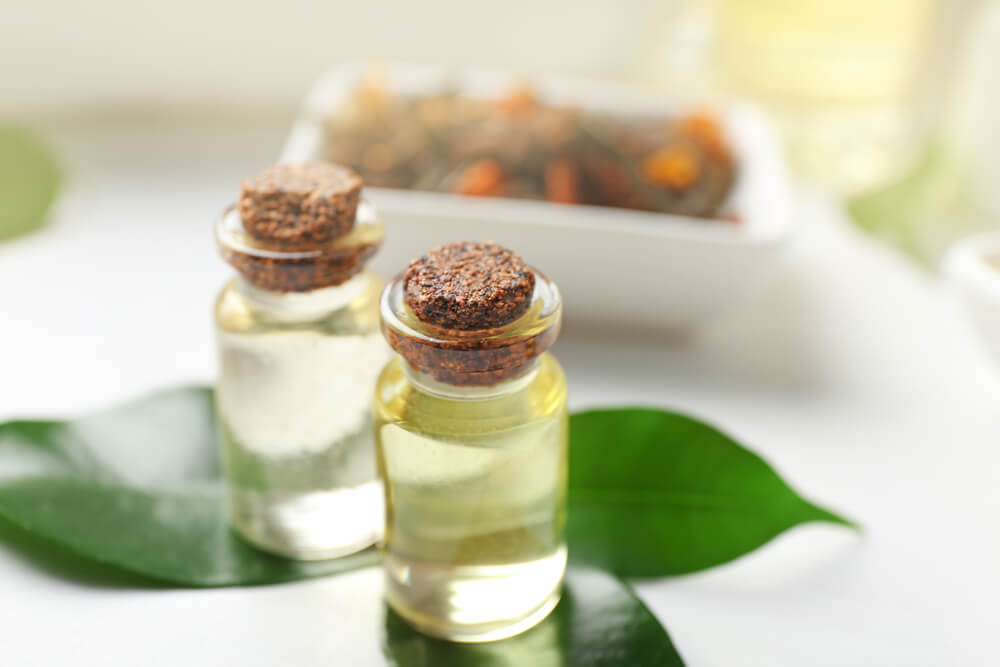
The health benefits offered by tea tree oil are endless. It is known to boost your physical and mental well-being.
Some people are allergic to tea tree oil!
Why Does It Work?
If the dryness is caused due to fungal buildup, the antifungal properties of tea tree oil can unclog the pores and boost natural sebum production. The antiseptic and antibiotic(8) agents will help relieve dry scalp symptoms. Further, the anti-inflammatory properties will relieve the itching. On the other hand, the moisturizing action of Jojoba oil will hydrate your scalp.
Ingredients
- Two to three drops of Tea Tree oil.
- 10mL of Jojoba oil.
Process
- Warm up the jojoba oil and add the tea tree oil to it.
- Apply this blend to your scalp and massage it for about ten minutes.
- Now, rinse it off with cool water.
NOTE: You could also mix some essential oil to your hair care products, like shampoo.
Frequency
Follow this routine twice a week.
3. Argan Oil for Dry Scalp
Nicknamed ‘Liquid Gold’ Argan oil is extracted from the kernels of the Argan tree in Morocco. It is widely used in skin and hair products.
Argan oil has a composition, which is much similar to the body’s naturally produced oils.
Why Does It Work?
The fatty acids present in argan oil lubricate the scalp and locks in the moisture. Further, the fatty layer prevents dryness. The anti-inflammatory(9) and antioxidant properties improve scalp health too.
Ingredients
- Argan oil.
Process
- Warm the argan oil and massage it into your scalp.
- Massage it for about fifteen minutes.
- Leave it overnight and rinse it off the following morning.
Frequency
Follow this hair care routine twice a day.
Also Read: The Best Essential Oils to Treat Stress
CURE 4: Supplements
If your diet lacks certain vitamins and minerals, you could consume supplements to compensate for the deficiency. In case of dry scalp, here is the perfect supplement:
1. Vitamin E

A number of hair products and cosmetic products are enriched with Vitamin E. It is known to protect the skin from the damaging effects of the sun and, as such, comes as no surprise that it prevents the scalp from drying out.
Why Does It Work?
Vitamin E has antioxidants(10), which reverses the damage caused by free radicals. Further, it boosts blood circulation, hydrates the scalp by locking in the moisture, and promotes hair growth.
Ingredients
- Vitamin E capsule.
Process
Consume the capsule as per your physician’s directions.
Frequency
Avoid consuming too much of Vitamin E. Consult your doctor for an adequate dosage.
CURE 5: Foods
The following foods can help with your dry scalp:
1. Apple juice
An apple a day keeps the doctor away. Along the same lines, apple juice can also help target your dry scalp woes.
Apples were the favorite fruit of ancient Romans and Greeks.
Why Does It Work?
The mildly acidic nature of apple juice offers exfoliation to the scalp. It gets rid of all the dead, flaky, and dry skin. Further, it balances the scalp’s pH and restores the oil production of the scalp.
Ingredients
- Juice extracted from one or two apples.
- One tablespoon Apple Cider Vinegar.
Process
- Mix the apple juice and apple cider vinegar. Apply it to your scalp and rinse your hair with it.
- Let the mixture stay on your scalp for about ten minutes and then wash it with plain water.
Frequency
You could use this trick twice a week.
2. Lemon juice
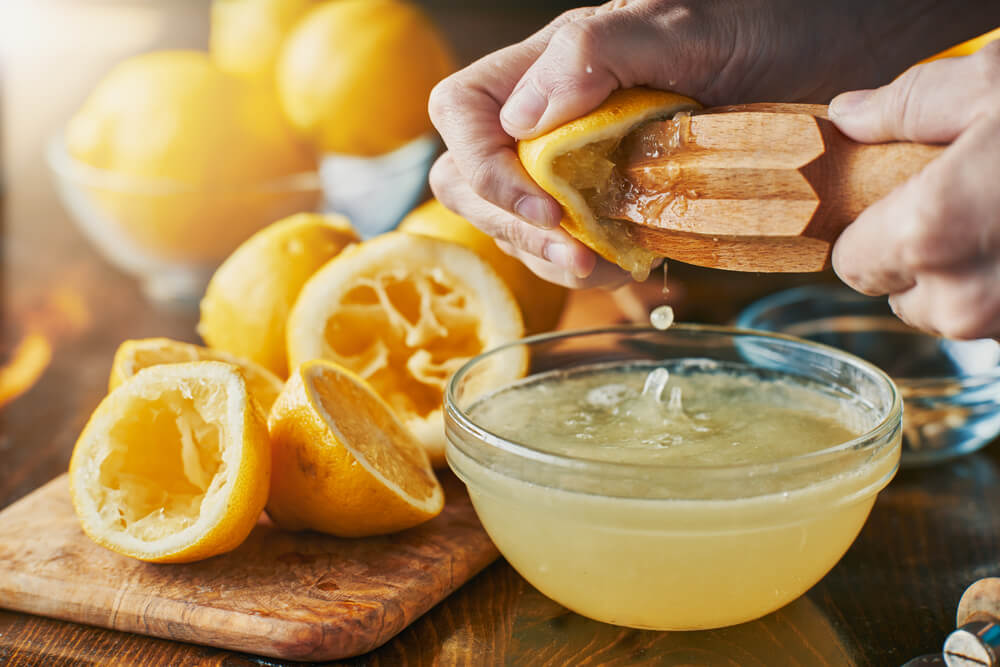
While everyone knows the trick of using lemon to treat dandruff, very few are aware that lemon could help with dry scalp too! Here’s how:
Why Does It Work?
Lemon is a natural astringent. Furthermore, it balances out the scalp’s pH and creates a mildly acidic environment, which prevents the breeding of microbes. Its antifungal properties are also capable of treating fungal infection.
Ingredients
- Half a lemon.
Process
- Part your hair in small sections.
- Apply the lemon directly on the scalp while gently squeezing out the juice.
- Once all the lemon is squeezed out, and the juice is applied to most portions, spread the juice evenly.
- Let it sit on your scalp for about five minutes.
- Rinse your hair with a mild shampoo.
Frequency
Follow this routine twice a week.
Just a little care can go a long way in dealing with a dry and itchy scalp. In addition to these natural remedies, it is extremely important that you drink copious amounts of water to hydrate your skin.
Finally, consuming a healthy diet that supplies you an adequate dose of vitamins, minerals, and fatty acids can improve your scalp health.
So, go ahead and try out these natural cures for dry skin and you will be pleased with the results!
FAQs
Let us now address a few frequently asked questions related to dry scalp.
1. What to Do for Dry Scalp?
If you are plagued with dry scalp, a variety of home and natural remedies have been listed out for you above. Depending on your body’s response to it, choose which works best for you.
Supplement these remedies with a balanced diet and an adequate water intake. After a while, you will notice a significant improvement in your scalp condition.
2. Does Dry Scalp Cause Hair Loss?
Unhealthy scalp robs the hair of its natural shine and lustre. Due to the buildup and the infection, your hair follicle may get weak, which could result in hair loss.
3. Is Shampoo Good for Dry Hair?
While excessive use of shampoo could cause dry hair, you could switch to a hydrating shampoo that could nourish your scalp. However, strictly stay away from chemical-rich shampoos as they may rob your scalp of moisture.
4. How to Cure Dry Scalp in Newborns?
Dry scalp in infants could lead to cradle cap. To prevent it, you can apply virgin olive oil or organic castor oil to moisturize your kid’s scalp.

